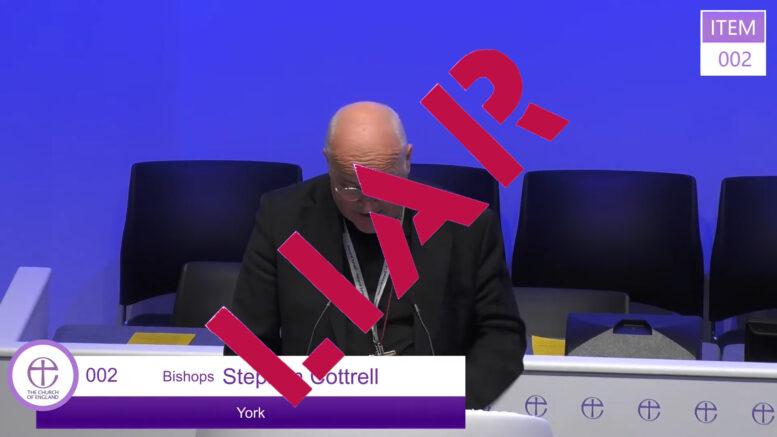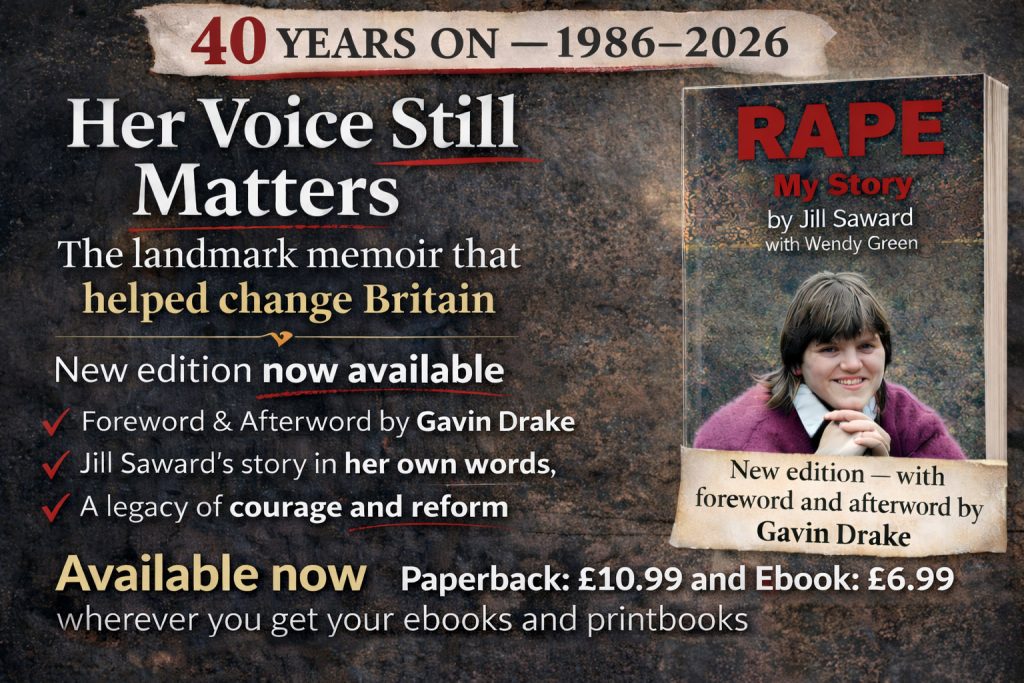If someone makes a public apology for previously “speaking incorrectly”, but in doing so they again mis-state what actually happened, is the apology genuine, or is it a case of a new lie to explain an old one?
Earlier this month, members of the General Synod gathered at the University of York. This is what the Archbishop of York, Stephen Cottrell, said at the start of his presidential address, He made these comments on Friday 5 July this year, 2024.
“Just before giving the address, Synod, I’d like to make a small correction to the record. Since the last meeting of the General Synod, and following publication of the Wilkinson Report, it has come to my attention that when I spoke in the ISB debate at the July Synod in 2023, I mistakenly said that the decision of the Archbishops’ Council to terminate the contracts of the two remaining members of the ISB was unanimous.
“In fact the Wilkinson Report states, of those voting 11 voted in favour, four voted against, four chose not to vote. I’m sure we will all remember, those of us who were here, it was a heated and difficult session. I spoke incorrectly and since it has been pointed out to me I wanted to apologise and put the record straight.”
He is right to say that the meeting in July 2023, where he made the error, was “heated and difficult”. But does that explain why he “spoke incorrectly”?
This is what he said in July 2023, answering a question from Synod member Robert Thomson, from the Diocese of London:
“I think I just want again to reiterate something that I said earlier: the decision that was taken, painful though it was, was taken because we believe, in the medium term, it will be the best way of providing what the Church needs in terms of scrutinising and overseeing the safeguarding of the whole Church in its ministry to everyone. But this was a collective decision, and it was a unanimous decision. As I think has come out, there may have been some disagreements around timings, because this was a sensitive issue, but they were not disagreements about the decision itself.”
It is easy to misspeak when you are speaking off the cuff in answer to a question you were not expecting. But the questions followed a scripted, prepared and rehearsed presentation by some members of the Archbishops’ Council, including Stephen Cottrell.
This is what he said in his introductory remarks – long before the session could be described as “heated and difficult”:
“I will make a few final comments at the end of this short presentation before we open up for questions. But the other thing I want to emphasis is that we do take collective responsibility for this as the Archbishops’ Council. Yes, yes, we wish we weren’t here, but we have proceeded all along in the knowledge that we are working with people of good will and in the belief that we all want the same thing. But we acknowledge that we have failed to get there. And the decisions we took in getting here were unanimous.”
If you look at the video of the presentation, you will see that when Stephen Cottrell says that the decision was unanimous, he was reading from his notes.
The decision being talked about is the Archbishops’ Council’s decision to scrap its “Independent Safeguarding Board”, or ISB. This was created to provide independent scrutiny of the Church of England’s continuing safeguarding fiasco. But the Archbishops’ Council didn’t really want a safeguarding board that was truly independent.
And so, after continuing push-back by the two real independent members of the ISB against continuing interference by the Archbishops’ Council, and fed up with criticism from the ISB over safeguarding failings, the Archbishops’ Council decided to scrap the ISB and sack its members – giving them just an hour’s notice before a public announcement.
The Archbishops’ Council even ignored advice given to them to ensure that those victims and survivors the ISB were working with were told ahead of a public announcement so that additional support could be put in place for them.
And so the Sunday afternoon Synod session, which Stephen Cottrell describes as “heated and difficult” was hastily added to the Synod agenda, replacing a session in which the ISB were to report to Synod on what they had found so-far.
That’s the background. Now let us go back into the detail.
Questions about the disbanding of the ISB were first formally raised at the Synod during “question time” on Friday 7 July 2023.
Asking a supplementary question to the Archbishop of Canterbury Justin Welby, Sam
Margrave from Coventry asked:
“Your response says that it was the decision of the Archbishops’ Council and not the two Archbishops personally. As a statement of fact, how did the Presidents vote on this issue at Archbishops’ Council?”
There was a comical toing and froing between Justin Welby and Canon Izzy McDonald-Booth, who was chairing the session, about whether or not he was allowed to answer the question, given the confidential nature in which the Archbishops’ Council chooses to operate.
“The advice I have been given”, Izzy McDonald-Booth said, “is for you to respond in writing after taking advice.”
Justin Welby: “I respond in writing after taking advice or you respond in writing after taking advice?”
Izzy McDonald-Booth: “You respond in writing after taking advice.”
Justin Welby: “And could you advise me as to who advises me? And do I publish the written response if that is the advice? I am quite happy to. I am asking for the legal opinion.”
Izzy McDonald-Booth: “Yes.”
Justin Welby: “Thank you. So why can’t I just tell people?”
Izzy McDonald-Booth: “If you wish to, you may.”
Justin Welby: “Both archbishops wished to wait a bit.”
Why was the Archbishops’ Council so determined to portray the decision as unanimous? That has not been explained. The claims began in a June 2023 paper from the Archbishops’ Council’s Secretary General, William Nye, to members of the General Synod. The paper, GS Misc 1341, was penned to provide background to the decision ahead of the “heated and difficult” session the following month.
In it, he writes:
“It is the considered judgment of the council, as a whole, that it is necessary to reset the process in order to get to the destination.”
Since disbanding the ISB, the Archbishops’ Council has spent more than one million pounds of charitable funds to defend its actions, including commissioning two reports from lawyer Sarah Wilkinson into the “creation, work and termination” of the ISB”; and by Professor Alexis Jay, the former Chair of IICSA – the statutory Independent Inquiry into Child Sexual Abuse – which found appalling behaviour by Church of England officialdom, into how an independent safeguarding structure for the Church of England should be established and how it should operate.
Sarah Wilkinson’s report sets out the vote in Archbishops’ Council on the decision to disband the ISB. Rather than being unanimous, 11 members of the Council voted to scrap the ISB; four voted against; and another four abstained.
So why the continuing insistence by the Archbishops’ Council and its staff that the decision was unanimous?
In his apology, Stephen Cottrell sought to explain his “speaking incorrectly” on the heated and difficult nature of the session in which he spoke.
This, however, does not stand the test of scrutiny.
Firstly, he made the comments twice: a, in his pre-prepared and scripted opening comments; and b, in answer to a question.
Second, it echoed the comments from William Nye that the decision was that of the Archbishops’ Council “as a whole”.
Thirdly, following Justin Welby’s comments that both archbishops wanted to wait before a decision to disband the ISB, the Archbishops’ Council’s communications staff proactively briefed the media to say that the decision was unanimous.
So if his explanation doesn’t stand up to scrutiny, what about his apology?
In setting out why he was “correcting the record”, he said that it had come to his attention that he had misspoken, “following the last meeting of the General Synod and following the publication of the Wilkinson Report.”
The Wilkinson Report was published in December 2023. Since then, there was a meeting of the General Synod in February 2024. So why has it taken until now, a year later, for Stephen Cottrell to realise that he had misled the Synod?
We may never know. But, if the apology is sincere, and if he meant it, why is the only record of it confined to the Synod’s (yet to be published) Record of Proceedings; and why is it not included in the published text of Stephen Cottrell’s presidential address on his own website?
A video isn’t as searchable as a webpage. So by delivering an apology before the presidential address, and doing it in such a way as to minimise its digital footprint, there isn’t much sincerity to it at all.
Stephen Cottrell did not make the claim that the Archbishop’s Council made a unanimous decision to disband the ISB in the heat of the moment during an off-the-cuff remark in answer to a question. He made it as part of a campaign of misinformation that sought to portray a decision as unanimous when it clearly wasn’t.
Why? Who knows! What difference does it make if the decision was unanimous or only partly supported? The decision was taken. But by choosing to lie, and continue to lie about it, the Archbishops’ Council continue to play their game of showing disdain to victims and survivors and demonstrate, very clearly, that they have no regard for the truth.
You could say that they are liars. I certainly do.
In preparing this report, I provided the Archbishop of York with a right of reply, and I asked three specific questions.
I asked whether he had been advised to say, in July 2023, that the decision was unanimous, his spokesperson said that the words he used were entirely of his own choosing and that there was no intention to mislead.
I asked whether he was part of the discussion and deliberations that led to the Saturday afternoon media briefing, where journalists were falsely told that the decision was unanimous. No answer was forthcoming; and the communications team at Church House in Westminster said that they had nothing further to add.
I also asked whether Archbishop Stephen been subject to a complaint under the Clergy Discipline Measure for the false statement. In response, his spokesperson pointed to the unlawful sections of the Clergy Discipline Commission’s Code of Practice which seeks to pretend that there is a legal requirement for confidentiality on clergy discipline cases.
If the Archbishops’ Council is as concerned as Stephen Cottrell claims to be about misleading statements on the demise of the ISB, why won’t they clarify the reasons behind their false media briefing. They could clear it all up. But, as we all know, the Archbishops’ Council doesn’t like to be honest when it comes to safeguarding.


Leave a comment